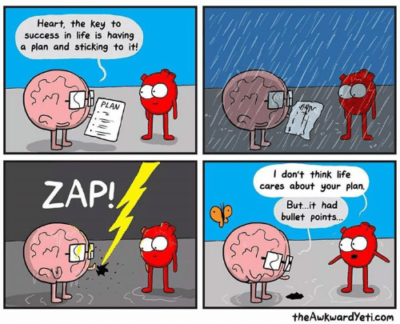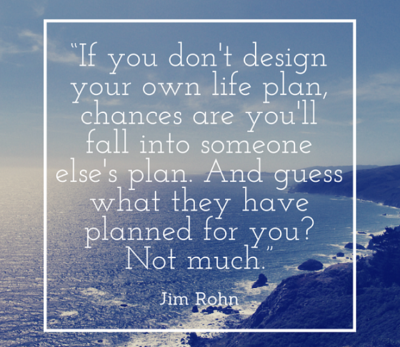
Every success-minded person has a plan. They know that it’s vital to turning their dreams into reality. It helps them plan for the future and manage their resources for the upcoming phases. When it comes to creating a life plan there are important factors to consider. Learn the four most important ones to keep in mind. (Estimated reading time: 6 minutes)
“Life is what happens to you while you’re busy making other plans.”
— John Lennon
The concept of a ‘life plan’ is an oxymoron to most people. After all, life by nature is not predictable – it seldom goes precisely according to plan.
I’ve seen this truth play out in my own life. When I compare my current goals with those that I had twenty years ago, I can see a big difference. Yet, I’ve always had a general sense of where I was going. There was always an undercurrent of what I wanted the essence of my life to be about which became increasingly evident as I gained experience.
I can relate a lot to the Disney character Moana and her quest to discover herself.
Moana is the strong-willed daughter of the chief of a Polynesian village. Her adventurous spirit urges her to take on a daring mission to cross the Pacific Ocean to save her people from devastation. Despite her father’s opposition to her plan, she sets off on an epic journey. Moana could not predict the kind of perils and monsters she would face. There were times when she didn’t know if she was on the right course to meet the goddess Te Fiti, or if she’d be able to help her village folk.

Even though Moana didn’t have a clearly laid out plan for fulfilling her quest, she was clear on her mission. It was her passion and dedication to her purpose that helped her beat the odds. While she had to shift course and improvise along the way, she eventually accomplished what she set out to do. With a little help from her friends.
What we can learn from Moana’s story is that passion is tantamount to building momentum, gradually grounding that passion into reality. The Universe responds to the amount of enthusiasm and focus we expend. It attracts to us the people, events, and circumstances that will assist us in fulfilling our desires. A big part of the manifestation process relies on our emotions.
A life plan should be seen as a flexible framework that isn’t set in stone. It’s an organic, living, breathing entity that will evolve and change throughout our lives. But it’s incumbent on us to listen to the voice of our soul, and to continually work on piecing together the subtle hints and clues that we receive about our purpose.

Many people get intimidated at the prospect of creating a life plan. They would rather ‘wing it’ and take life as it comes. I’ve met people who claim that a plan constrains them and they prefer living spontaneously. While others are just too busy to make one and would rather chill out in front of the TV or play on their smartphones. These are the people who end up being passive spectators, watching their lives unfold a day at a time.
If you fall into this category, let me ask you this: would you risk spending 5, 10, or 20 years of your life chasing and working hard on the wrong things? How would you feel if you reached 50 or 70 years of age only to realize that you’ve followed the wrong path – a path that didn’t really fulfill you or make the best use of your talents? Is living on the fly worth the feelings of discouragement, regret, and disillusion?
The good news is that creating life plans does not need to be a complicated process. You don’t need to spend hours creating intricate schemes for an unknown future. You can craft a plan based on where and who you are at any given moment, based on your current desires, knowledge, and consciousness. A general idea of what you want in life provides a sufficient trail to trace your next steps.

Think of it as a treasure hunt. A life plan is like the map on your quest to find the treasure. You won’t know where to go next until you see your next clue. Those clues will come in the form of interests and people you’re passionate about. When you feel a certain charge towards someone and something, you can be sure that you’ve stumbled on a ‘clue’ that can move you forward.
Every success-minded person has a plan – they know that it’s vital to turning their dreams into reality. It helps them plan for the future and manage their resources for the upcoming phases.
Here are four essential things to consider when charting out your life journey:
1. Long-term goals and personal vision: You can’t create a life plan without knowing your destination. For this, you need to look within and continually work on developing a deep sense of self-awareness. This usually comes from a combination of life experience and consciously engaging in activities (reading, workshops, assessments) to expand your self-knowledge. Having a vision of where you want to go makes it easier to create a roadmap and develop a plan for focused action. If a lifetime vision plan does not seem feasible, break it down to a 10-year, 5-year, or 1-year plan – whatever timeframe you’re comfortable with.
2. The possibility of not achieving desired outcomes: Preparing for things that won’t go according to plan needs to occur on the tactical and psychological front. We have to train our mind and heart for the possibility of failure by adopting an attitude of experimentation. When you see your life plan as a strategic process of trial and error, it offers you the clarity to adjust your course in a favorable direction. Flexibility, resilience, and faith will help you overcome potential obstacles without getting devastated and giving up. Arm yourself with the tools, coping mechanisms, and Plan B’s so that you can deal with unexpected turbulence.
3. Unexpected events, people, and opportunities: There are numerous factors beyond our control that go into making big life decisions. Things may come from the left field when you least expect them and force us to change course. It does not always have to be negative, such as an illness, death, or loss of a job. It could also be positive such as a business idea that pays off well, meeting the love of your life, or having children. Of course, there’s nothing that we can do to predict this. All we can do is be aware that these occurrences are a possibility and to have faith and stay flexible along the way, to deal with unanticipated changes that can shift our trajectory.
4. A change of heart from perspective shifts: We’re always growing and evolving. As we gain wisdom from our experiences, our perspectives shift, and often, so do our desires. What you desired in your teens and 20’s may not do it for you when you reach your 30’s and 40’s. For example, when we’re younger, we generally seek a partner who is physically attractive, witty, and exciting. But as we mature, we realize that what really matters in a partner is their character, trustworthiness, responsibility, and their capacity for empathy and kindness. We begin seeking different kinds of partners based on what we learned from our dating experiences.
All of us will reach those final moments on our Earthly journey when our lives will flash before our eyes. When you’ve consciously crafted and followed a plan based on your soul’s mission, you’ll be happy when you see that you lived a life that’s worth watching and celebrating.
All my best on your journey,
Seline

Question: Are there any other important things that you would like to consider when creating a life plan?
Did you like this post? Sign up below and I’ll send you more awesome posts like this every week.

I have always loved those little heart vs brain comics! They are so simple yet so spot on an that is what makes them so funny and memorable for me at least. you bring up some interesting points in this piece- I’ll be thinking about what you said here for a bit I think as I try to wrestle with some of these things in my own life. Thanks for sharing with the rest of us Seline!
Melinda
Coming at this from th perspective of someone with many years behind them in this life, it is a lesson people need to learn!
The sooner people can get an idea of what they want and what their passions are the happier they will be. You fight for what you want and your passions drive your work ethic, something many today see to be lacking. My advice to you Melinda is to not give up and to find something you are passionate about and make that your focus in life.
Do that and you will never lack mtoivation and drive and will be happier in the long run. Good luck to you.